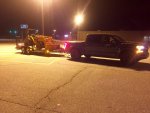In the night time pic, I was towing an 18-foot deck tandem axle equipment trailer with a GVWR of 16,200lbs loaded with a Kubota L4310 GST 4x4 tractor, loaded rears, and a 6-foot flail mower. The weight of the tractor, loader, and implement was approximately 6200lbs. The empty weight of the trailer was 3500lbs, giving a total towed load of 9800lbs (counting chains, binders, and equipment in the trailer toolbox).
This load was being pulled behind my 2018 Ford Raptor pickup. It is a good example for the OP to compare to. My Raptor is a base 800 crew model with a 1200lb payload capacity and a max tow rating of 8,000lbs. I used a Reese weight distributing hitch and balanced the load on the trailer. As you can see, this combination is sitting pretty level. It is somewhat over the Raptor's tow rating, and that is something to consider. My experience is that stability was just fine, braking was fine (using the Raptor's integrated trailer brake control, properly set up). Towing up long hills in the heat of summer could actually tax the Raptor's considerable power, however. My loads were getting heavier and hence the eventual decision to stop towing with this vehicle. Prior to using the Raptor, I'd only had gas and diesel Ford Super Duty trucks. Those are better tow vehicles for sure. Since then, I've had two RAM diesel trucks, which also tow very well.
Gooseneck trailers are heavier trailers with more weight on the pin to start with because of the actual gooseneck assembly. They are designed to put more weight right on the rear axle, providing a nicer towing experience. However, they are designed to leverage the much greater payload capacity of a heavy duty truck.
Conventional tow trailers should have about 10% of the total trailer loaded weight on the hitch. Gooseneck is 15% to perhaps 20%. Since a half-ton truck has much less payload to begin with, the whole gooseneck proposition becomes a loosing one.
A 7,000lb load is well within an F-150's capabilities. If the tongue weight is really 1800lbs, then you have to load too far forward. It sounds like it has to be in order to "fit" your equipment. Rather than buy a new truck, I'd but a longer trailer which can allow you to shift the load backwards.
I do agree a half ton gets stuck less easily than a heavy duty truck. You can mitigate that by installing better tires on the heavy duty truck to an extent. I'd prefer the bulk of the heavy duty truck for better towing control myself, and I do tow off-road myself. However, I stick to hard fire trails and avoid soft areas.



